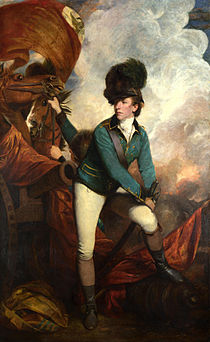British Legion (1778)
General Lord William Cathcart Lieutenant General Sir Henry Clinton
The British Legion was the name of a British provincial regiment established during the American Revolutionary War, composed of British Loyalist American infantry and dragoons. It was colloquially known as Tarleton's Raiders, the Green Horse, and the Green Dragoons, after the British officer who led most of its day-to-day activities, Lieutenant Colonel Banastre Tarleton, and the green uniform coats of its officers. "Legion" was an 18th-century term for a military unit the size of a regiment, but consisting of infantry and cavalry, or infantry, cavalry, and artillery, all under one command, to make it more flexible for scouting or irregular operations than a regiment, which consisted of infantry or cavalry alone.
This unit was raised in New York in July 1778 by Sir Henry Clinton in order to merge several small Loyalist units into a single force, a "legion" that combined infantry and cavalry forces and a battery of "flying" (light and fast moving) artillery. The infantry consisted of the Caledonian Volunteers, a partially mounted and partially foot unit raised in Philadelphia in late 1777 and early 1778, Ritzema's Royal American Reformers, the West Jersey Volunteers, and some members of the Roman Catholic Volunteers. The cavalry combined, in whole or in part, elements of Captain Kinloch's independent troop of New York Dragoons, the Philadelphia Light Dragoons, Emmerich's Chasseurs, the Prince of Wales' American Volunteers, and the 16th Light Dragoons. The regiment was commanded by William, Lord Cathcart, as colonel; Banastre Tarleton was commissioned as lieutenant colonel. Once the unit left New York, Tarleton took full operational command. The Legion's peak operational strength was approximately 250 cavalry and 200 infantry.
...
Wikipedia

